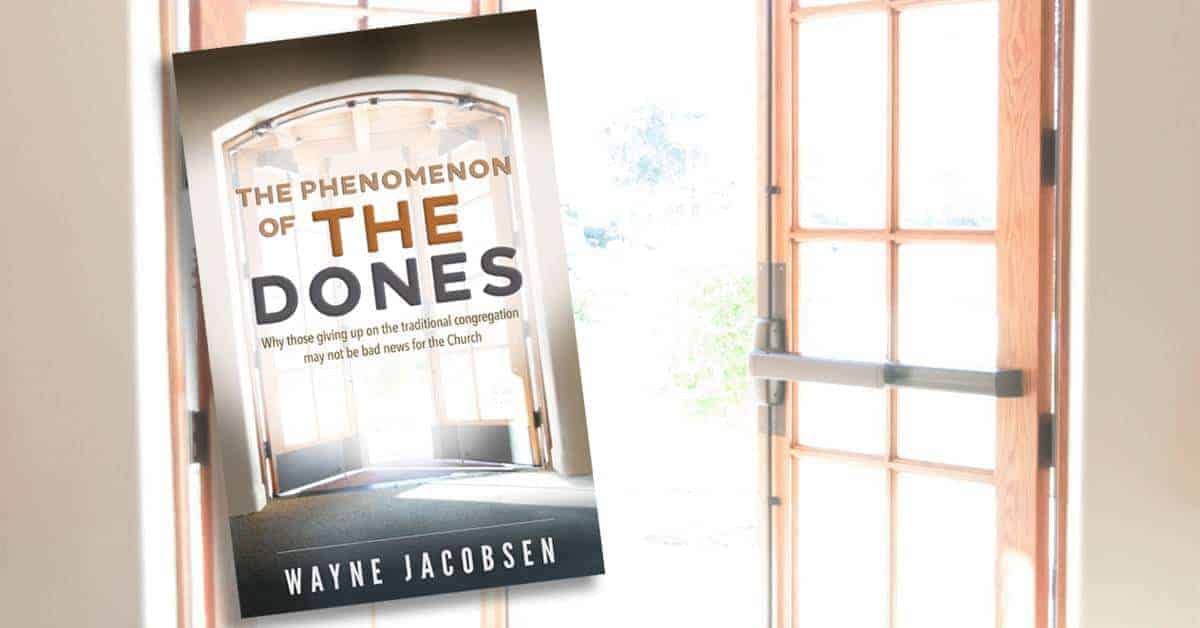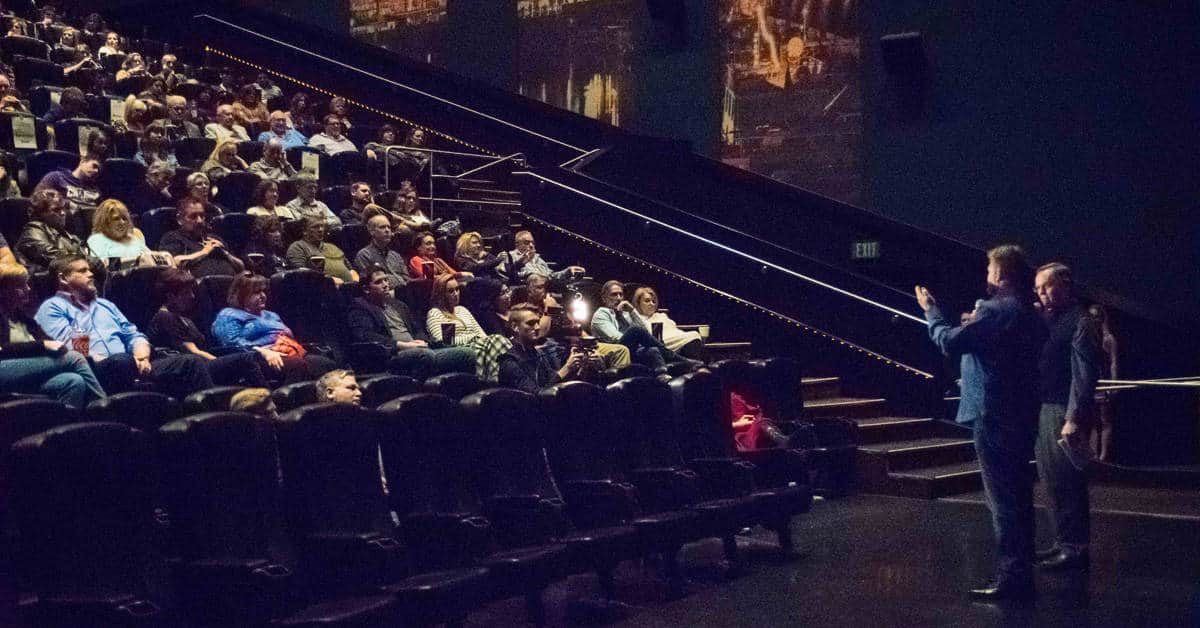By Wayne Jacobsen Part 12 in a continuing series on The Phenomenon of the Dones.
When did truth become more important than love?
When I grew up in Christianity I was taught that you had to believe the truth to be saved. Of course loving each other was encouraged, but certainly not with the same passion. So living to doctrine and defending it when challenged was more important than loving others, even though Jesus specifically told us to do the latter. In fact he said our capacity to love would win the world, not our eloquence with the truth.
In fact, truth without love more often destroys people than helps people. Those who explore theology alone and don’t mine the depths of God’s love and character can’t help but be a bit obnoxious. For them it is all about believing the right thing and what they miss is a process of transformation. They are often angry, manipulative and judgmental. On what basis, then, has truth set them free? Are they more gentle, loving, and kind to others who are lost? In my experience? No.
That may be why Jesus and Paul both told us love was more important because they knew that without love people would not be able to discover truth. I’m convinced that truth can travel without love. You speak the truth without it and little good it does. But love can’t travel without the truth. Love always seeks what’s true and then graciously draws people toward the light. We never need to choose love at the expense of truth when we appreciate that love is the most important part of truth and the environment in which people are freest to discover what’s true.
Unfortunately, however, for two thousand years Christians have staked their identity on being right. Battles over doctrine, even down to insignificant minutia, have divided us into innumerable factions, each one believing they have more truth than the others. So that instead of learning to love each other beyond our differences, every difference is a test of who is right and who is wrong. We get sucked into the same game the world plays of having to convince those who disagree with us of how wrong they are.
I see the fallout from that every day in my FaceBook feed, especially as people try to convince their friends that the truth they see is the truth everyone needs to believe. And the more insecure someone is the more they are drawn into the battle over truth instead of learning how to love. We expend far more energy trying to prove someone wrong than we do helping them discover how loved they are.
Often we do it without even thinking. Recently I asked for some input on a book cover design. I got over 300 responses and the majority registered their preference as if it was the only right option. People who didn’t see it the same way were wrong, not just seeing it differently. When we no longer separate preference from fact, we express ourselves in way that is off-putting to others, and closes more doors than it opens.
Nowhere is this more evident today than in the argument about whether or not someone must go to a local congregation to be a Christian. Every one fights for their point of view convinced that anyone who disagrees with them is wrong. One seeks validation of their faith experience, the other demands compliance and both divide the body of Christ not on the basis of Truth, but on personal preference. Much of the angst I’ve seen in those “done” with religious institutions is the need to convince those who meet in those systems that what they are doing is wrong and hurtful, or those inside try to convince those outside that they can’t be part of Jesus’ church without being a committed member of a local institution.
And as I’ve observed over the years, some of those who most ardently defended local congregations when they were leading them are the most damming now that they are on the outside.
If you live by right or wrong, you will condemn others to validate yourself. A lot of that dialog stems from insecurity—people who need the affirmation of others to validate their own conclusions. Both misunderstand the nature of truth and how God wins us into it. Of course this conflict is exacerbated by social media platforms because arrogant, polarizing commentary generates more response than graceful ones. We care more about being right on an issue that we do about being right with each other.
“Truth cannot be compromised,” is the motto of both sides of any conflict and while true enough on the face of it, it doesn’t recognized how much of what we fight for is not truth itself, but only our view of it. How often have you ardently defended something you found out later was based on misunderstanding or misinformation? One of the joys of this journey is discovering that God’s wisdom far exceeds ours on everything and we are constantly growing to understand what’s true and what are only fabrications of our desires. That’s why Jesus wanted us to know that Truth was not the perfect alignment of our doctrinal ducks, but our connection to a Person who is Truth itself. By believing him we believe in all truth, even the parts we don’t know yet, or still have confused.
That’s why one of the telltale signs of someone growing in truth is humility. Knowing they see dimly into God’s reality allows them to hold it lightly and not seek to force it on others.
Their tone expresses that this is the best they see it today, not this is the only way a real child of God can see it. When you hear that kind of language, back away. This is someone who knows doctrine better than they know him. Find those who can discuss difference of opinion graciously, knowing that love, not judgment, is the best way to help people discover truth and that growing in truth has more to do with learning to depend on him rather than amassing intellectual knowledge alone.
None of this is to say, of course, that truth is not important, only that most of our truth isn’t truth with a capital T, but simply our own conclusions based on the comfort it gives us at the time. I’m all for getting our theology straight; I’m not a relativist. I don’t believe everyone gets to decide what’s true. What’s true in the universe is how God designed it to work and created us to live in it. Where we embrace that reality, we get to live freely even in a broken world not immune from its pain, but also not overwhelmed by it. There are only a precious few big-ticket items that provide the basis of life in Christ, and none of them are essential to be loved because love opens the door to truth.
One of Jesus’ most oft-quoted statements is, “You will know the truth, and the truth will set you free,” (John 8:32). Mostly those words are misapplied as if he’s referring to the right set of beliefs and is used to justify people forcing their point of view on others. What if, however, he was not only telling us what truth could do, but how to share it with others? It is valuable when it sets people free, and disastrous when it seeks to manipulate people to do what we think best.
The ways of the world are all built on lies—lies about God, about ourselves, about success and failure, about what we value and how we engage others. Believe the lies and you become imprisoned by them in long, slow death spiral. Truth is the bright light that penetrates the darkness. Our tendency is not to run to it, but shield our eyes and stay in the false comfort of those lies. Love is what makes the light inviting instead of repelling.
When I read the Gospels, I am increasingly aware of how careful Jesus was with the truth. The truth is powerful stuff. It can blow up someone’s entire world. That’s a great thing when they are ready for it, but it can be horribly destructive if they are not. That’s why he was so mindful how, when, and to whom he shared truth. He sometimes couched it in stories so people who weren’t ready to receive it wouldn’t understand it.
If you’ve ever tried to convince someone that something is true when they don’t want to hear it you know how impossible it is. When Jesus spoke clearly, he was talking to those who were curious. Even then he didn’t talk about truth as a set of theological concepts to believe, but the truth that allows you to see past the lies that ensnare us and set you free to embrace God’s realty. The only time he confronted people with truth they weren’t ready for was when their actions were doing great damage to others and, even then he wasn’t heard. There’s nothing more glorious than truth that brings freedom and nothing more destructive than beating others up with truth we think they should hear.
Fifteen years ago I was riding in a car with my dad when he asked me a question. “Do you enjoy what you’re doing now?” Five years earlier I had been a pastor of a growing congregation in the central part of California. Through a painful set of circumstances I got separated from that group and he wasn’t sure how content I was with the consulting, writing and traveling. I thought he was really asking if I missed being a pastor.
I thought about it for a moment and realized that I had moved from being a leader of a conformity-based system to a brother alongside people seeking to find their freedom in Christ. “Well, Dad I used to walk around with a set of keys making sure everyone was locked into their cells. For the past five years I’ve been wandering those same hallways but this time unlocking the prisons that hold people captive.”
“That does sound good,” he responded.
It is! And this isn’t about whether people frequent a congregation or not. This is about feeling I had the responsibility to conform people to what I thought was best for them instead of freeing them to live in an affection-based relationship with God and letting him change them. I’ve never regretted that choice. And I’ve seen far more fruit rise from helping them live free than I ever did from trying to get them to believe my conclusions or meet my expectations.
I don’t try to convince anyone of anything anymore. I talk to hungry people about God’s reality as I best understand it. When they are ready for it, they respond in ways that liberates and fulfills. When they aren’t, I measure my words more carefully seeking a way to love them rather than try to set them straight. Only the Spirit can prepare them for the truth he wants to breathe into their lives. The more I try to convince them, the more I push them away from the light I want them to see. Instead I want to treat them in a way that will invite them into the orbit of his love where they will be better prepared to see through their deception and embrace what’s true.
That’s why love is the more excellent way. Without it, truth won’t find it’s way in the world.
__________________
This is part 11 in a series on The Phenomenon of the Dones by Wayne Jacobsen who is the author of Finding Church and host of a podcast at TheGodJourney.com. You can read the first half here and subsequent parts below:
- Part 8: Five Factors Contributing to the Decline in “Church Attendance”
- Part 9: An Invitation Not An Imposition
- Part 10: The Conversations that Matter Most
- Part 11: Monetizing Ministry
If you’d like to subscribe to this blog and receive future posts by email you can sign up at the top of the right-hand column of our home page.









Jesus told the disciples the He was the truth ( John 14:6). Maybe the real freedom comes from knowing the truth that is Jesus?
“That’s why Jesus wanted us to know that Truth was not the perfect alignment of our doctrinal ducks, but our connection to a Person who is Truth itself. By believing him we believe in all truth, even the parts we don’t know yet, or still have confused.” Thank you, Wayne! This was so encouraging to me today.
Thank you! This article reminded me of numerous conversation my husband and I have had about our journey. We left “church” to find church, but at times we felt forces even within the house church movement trying to “lock us into our cells” (to paraphrase your comment to your father above). I wrote about it here: https://beautifulquestion.com/2012/10/06/love-vs-ideology-what-motivates-us-to-gather/. The more I know the Lord, the more I have come to realize that Love is absolutely central, and all else flows from that.
“The only time he confronted people with truth they weren’t ready for was when their actions were doing great damage to others and, even then he wasn’t heard.”
So true, but I’d go a step further and say, even with them he often couched the truth in stories – the prodigal son, the Good Samaritan, etc. There were of course moments that he spoke very plainly, but who knows, perhaps he saw Nicodemus and others like him standing by with curiosity and interest, and thought “I’ve got to speak plainly so that those who are ready can hear this.” The only reason I say this is that argument of “doing damage” is what we always use when we want to use truth as a bludgeon rather than a scalpel. We are too quick to say “you white-washed tombs” and too slow to say “for God so loved the world,” too slow to tell the story of a man who loved his two sons who goofed up in very different ways.
You shall know the Truth, and the Truth shall set you free. Truth is a person named Jesus. He sets us free, not doctrines or principles. Verily, verily… Thanks Wayne.
Thanks Wayne. I always need to hear this again and again and again to step aside from the ready Pharisee in me. My wife shared a quote with me – ‘Never tell an untimely truth’ – which is a good safety when we think of saying something unhelpful or judgemental or try to win a point.
Wayne, I love this article, especially the way in which you’ve closed any possible competition from developing between the 2 seemingly competing ideas (at certain times anyway ) of truth and love. Perhaps this focussing on 2 apparently inharmonious ideas is a result of our Western (Greek or Platonic) mindset.
Recently this came up in one of the groups I attend with the ideas of God’s love vs God’s judgement. It was eventually dissipated by the view of God’s judgement and discipline as an expression of God’s love. God is so good! Daniel
Most people truly misunderstand judgment and punishment as a balance to God’s love. I like that you say they are expressions of it. That’s true of judgment as God sets things right, but I don’t think love punishes. It disciplines, but that’s a very different thing. Discipline is training to be fruitful and fulfilled. Punishment is just to do something bad to you to make up for what you did bad to someone else. I think sin is it’s own punishment. The consequences of it destroy us from the inside, and unfortunately do great harm to others as well. God doesn’t need to punish us for sin, but to rescue us out of it.
Thank you… This was good to hear again. I have backed off incredibly from people who “want to be right” , but every once in a while I find myself in a situation where I have added fuel to the there fire. I only cause an arguement where I had hoped for conversation.
Ruby Neumann
Thank you for another great article! You know there is also great freedom and peace when we learn to relax into just loving people, not trying to change people, and patiently allowing the holy spirit to do the work. Let’s face it outside of pride, the need to play god and be in control,(most of the time because we just are not patient) are two huge sins that fight against us being humble. Pride and need for control are also both signs of lack of self-esteem in people, mainly because they lack feeling loved, mainly by this loving Father but then also by others.
I know in my own life I was a follower of Jesus my whole life, read the Bible and everything but struggled greatly with pride and control. In my mind I could tell you Jesus was a loving Father and loved me, but you could say I never accepted that or maybe understood that. I found that until I actually accept, and really began to understand that, I really had a hard time loving other people for who they were. If you did not fit in my box, sorry you were out.
It was not until I really start to understand Father’s love for me, that my love cup could finally get filled faster than the world was draining it from me. It was at that point that I had love to give out and show others and it was in this processes that I discovered that we each have our own “god-journey” and none of them are the same. As I like to explain it to people we are all on this big map, on different paths and if I try to tell you how to go to get “change” I might be sending you farther away or into more danger. Because what for me might be heading north, might be east or west for where you are on the map, I need to just love and support you where you are and let the holy spirit be your compass, not me.